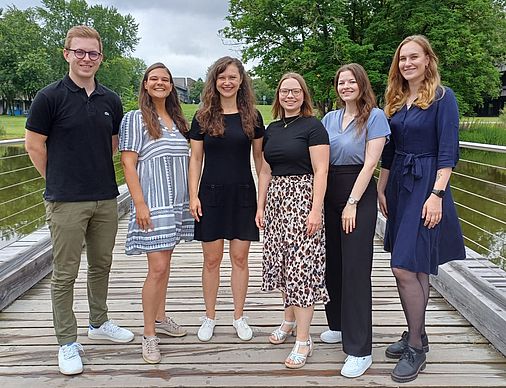
Assistant Professor for Civil Law and the Law of the Algorithm-driven Economy
Presentation: information overload in e-commerce
At the German Society for Law and Computer Sciences’ (DGRI) Annual Conference 2025, on November 13, Tabea Bauermeister gave a presentation on information requirements in e-commerce. In addition to a comprehensive problem analysis, she discussed various possible solutions and, in particular, proposed that legislators focus more strongly on legal design.

Spindler/Schuster/Kaesling: Commentary on Articles 30, 31 und 32 Digital Services Act
On November 12, the fifth edition of Spindler/Schuster/Kaesling, Recht der elektronischen Medien (Law of Electronic Media) was published. Therein, Tabea Bauermeister comments on Articles 30, 31, and 32 of the DSA. Moreover, she wrote an introductory to this section. Section 4 of the DAS imposes specific due diligence obligations on providers of online platforms that enable consumers allowing consumers to conclude distance contracts with traders.
Lecture: European Competition Law at Nanjing University
At the end of September, Tabea Bauermeister gave a two-week course on European competition law at Nanjing University. The German-Chinese Institute for Legal Studies regularly offers German courses to their students.
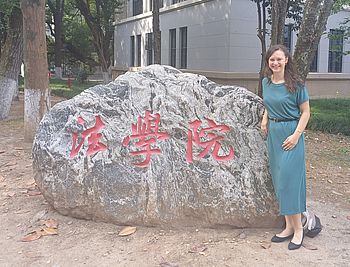
Presentation and Paper: Section 327r and Section 308 n° 4of the German Civil Code – a difficult relationship
Should a contractual clause giving the provider the unilateral right to change a digital product be assessed under Section 308 N° 4 BGB, Section 327r BGB, or both provisions simultaneously? At the “DSRI Herbstakademie 2025”, Tabea Bauermeister explored the relationship between the two provisions. The manuscript was published in Bernzen/Heinze/Steinrötter, DSRI Herbstakademie 2025, 1. Auflage 2025.
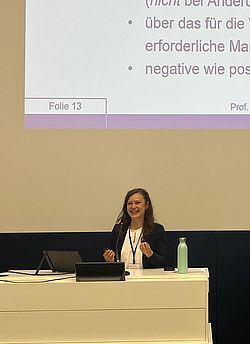
Paper: Digital Markets Act and Artificial Intelligence
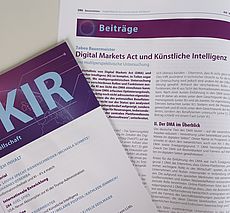
In the August issue of KIR, Tabea Bauermeister explores the relationship between the Digital Markets Act (DMA) and artificial intelligence (AI). As part of a multi-perspective analysis, she examines the various roles and functions that AI can assume from the DMA’s perspective: that of an optimization tool already covered by the DMA, that of an independent service not yet addressed, and that of a potential beneficiary.
BeckOK UWG: Commentary on German provisions implementing the Representative Actions Directive published
With the 29th edition of the BeckOK UWG (an online commentary on the law of unfair commercial practices and related areas oft he law), the section covering §§ 1 to 21 and §§ 41 to 50 of the Consumer Rights Enforcement Act, jointly authored by Tim Melhardt (HSU) and Tabea Bauermeister, has been published. The authors explain the legal provisions and engage in an in-depth discussion of their EU-law background.
Conference: Sports between Markets, Market Power and New Media
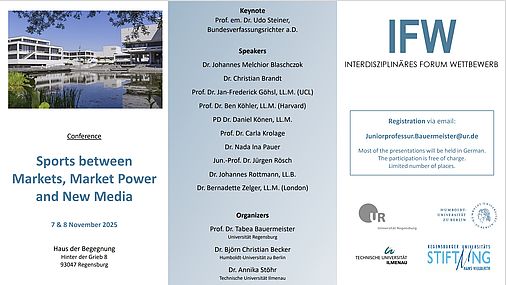
The 2nd conference of the IFW on the general theme 'Sports between Markets, Market Power and New Media' will take place on November 7 and 8, 2025. You can find more information here.
Presentation: The Assignment Model as an Extra-Legal, Legal Tech-Based Form of Class Action (29.5.25)
During Tashkent Law Spring, Tabea Bauermeister gave a presentation on the German Assignment Model. After introducing the business model and its development independent of any statuary background, she explored the question of whether general policy implications can be derived from the emergence of the Assignment Model.
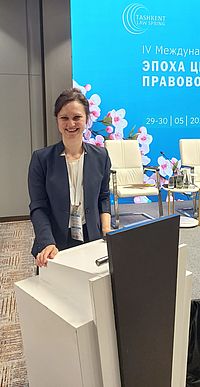
Anthology: ‘Private Enforcement im Digitalen Binnenmarkt’
Following the conference in June 2024, the anthology ‘Private Enforcement im Digitalen Binnenmarkt’, co-edited by Sebastian Schwamberger and Tabea Bauermeister and generously supported by the Fritz Thyssen Stiftung, has now been published by Mohr Siebeck (both softcover and open access).
The anthology deals with the challenges of private enforcement of the more recent European Digital Legal Acts: Although the European legislator has enacted numerous, interlocking Acts for the Digital Single Market (e.g. the Digital Services Act, the Digital Markets Act, the Data Act, the General Data Protection Regulation and the AI Regulation), they display very different, and in some cases no rules on private enforcement. Notwithstanding, similar questions arise, e.g. about a possible European concept of damages, collective enforcement or the conflict of laws. The 13 authors address these issues from an overall perspective, analysing and comparing solutions within the different acts.
Book Chapter: Private enforcement of the DMA
Following the conference in June 2024, the anthology ‘Private Enforcement im Digitalen Binnenmarkt’, co-edited by Sebastian Schwamberger and Tabea Bauermeister and generously supported by the Fritz Thyssen Stiftung, has now been published by Mohr Siebeck (both softcover and open access).
The anthology deals with the challenges of private enforcement of the more recent European Digital Legal Acts: Although the European legislator has enacted numerous, interlocking Acts for the Digital Single Market (e.g. the Digital Services Act, the Digital Markets Act, the Data Act, the General Data Protection Regulation and the AI Regulation), they display very different, and in some cases no rules on private enforcement. Notwithstanding, similar questions arise, e.g. about a possible European concept of damages, collective enforcement or the conflict of laws. The 13 authors address these issues from an overall perspective, analysing and comparing solutions within the different acts.
Book Chapter: Private enforcement of the DMA
In the anthology ‘Wettbewerb auf digitalen Märkten' ('Competition in Digital Markets’), edited by Dr Björn Becker and now published as an Open Access version, Tabea Bauermeister examines the private enforcement of the DMA. Specifically, she analyses whether EU law is not only open to its private enforcement but demands it.
BeckOGK: Contributions on German and EU leniency provisions published
The new commenterary BeckOGK on whistleblower protection law has been released, including the contributions by Tabea Bauermeister on the competition law provisions of Section 33e GWB, Sections 81h–81n GWB, Section 22 HinSchG, and Article 23 Regulation 1/2003. They present Germany’s and the EU’s leniency regimes, the civil-law protection of leniency applicants against joint and several liability, and the role of the Bundeskartellamt as an external reporting body under the HinSchG (German Whistleblower Protection Act).
Blog post: ‘EU Competition Law, the Assignment Model and why Roundwood is (partially) on the Wrong Track‘
The Landgericht Dortmund (Regional Court of Dortmund) decided on referring to the ECJ for a preliminary ruling in Roundwood Case asking about EU law’s stance on the Assignment Model in the area of competition law. On the Kluwer Competition Law Blog , Tabea Bauermeister took the occasion as an opportunity to explore the connection between EU competition law and the Assignment Model asking whether EU law precludes the mechanism or – on the contrary – even demands for it.
Presentation: Collective Private Enforcement of EU Platform Regulations & the Assignment Model (November 7, 2024)
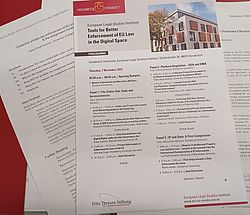 In Germany, there is an ongoing debate about the Assignment Model, an extra-legal mechanism of bundling damage claims. However, this debate almost exclusively focuses on the German Rechtsdienstleistungsgesetz (Legal Services Act). Yet, in the context of EU platform regulations, another aspect must also be taken into account: the general principles of EU law. On November 7, during the “Tools for Better Enforcement of EU Law in the Digital Space” conference at the University of Osnabrück, Tabea Bauermeister held a presentation on this additional dimension.
In Germany, there is an ongoing debate about the Assignment Model, an extra-legal mechanism of bundling damage claims. However, this debate almost exclusively focuses on the German Rechtsdienstleistungsgesetz (Legal Services Act). Yet, in the context of EU platform regulations, another aspect must also be taken into account: the general principles of EU law. On November 7, during the “Tools for Better Enforcement of EU Law in the Digital Space” conference at the University of Osnabrück, Tabea Bauermeister held a presentation on this additional dimension.
Presentation: Digital Content and Digital Services in EU Contract Law (October 11, 2024)
On October 11, the School of Law at Zhongnan University of Economics and Law (Wuhan, China) hosted the international symposium “Private Law and Digitalization in Comparative Perspective”. Tabea Bauermeister participated and held a presentation on the Digital-Content-Directive.
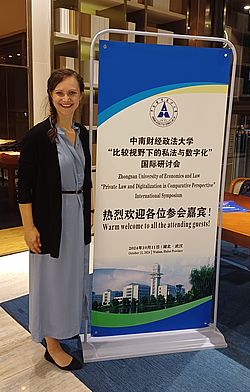
Paper: ‘Instrumentalisierung als Weltpolizei?’ (Instrumentalization as a Global Police Force?)
Following the conference ‘Wirtschaft und Methode’ (Economics and Method) at the University of Vienna, the associated conference volume Ewerz/Soldo/Tokic, Wirtschaft und Methode (here in German) has now been published. In her contribution “Instrumentalisierung als Weltpolizei? Das Unternehmen in den europäischen Bestrebungen um eine CSDD-Richtlinie“ (Instrumentalization as a global Police Force? The undertaking in the European efforts toward a CSDD-Directive), Tabea Bauermeister examines the implications of the scope of application of the CSDD-Directive.
Panel Discussion: "EU-Competitiveness in a Globalized World: Competition Law and OR vs Regulation?" (September 6, 2024)
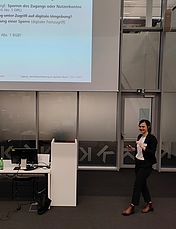 As part of the Young Competition Law Scholars Conference “Think Big – Questioning the Role of Competition Law in the 21st Century”, Tabea Bauermeister participated in a panel discussion on September 6 addressing the question “EU-Competitiveness in a Globalized World: Competition Law and OR vs Regulation?”. The discussion focused on issues of market failure and legislative failure, the significance of the DMA for the EU’s competitiveness, and how it relates to traditional competition law.
As part of the Young Competition Law Scholars Conference “Think Big – Questioning the Role of Competition Law in the 21st Century”, Tabea Bauermeister participated in a panel discussion on September 6 addressing the question “EU-Competitiveness in a Globalized World: Competition Law and OR vs Regulation?”. The discussion focused on issues of market failure and legislative failure, the significance of the DMA for the EU’s competitiveness, and how it relates to traditional competition law.
BeckOGK: Updated contribution on Article 6 Rome II-Regulation published
Article 6 of the Rome II-Regulation serves as the special conflict-of-laws provision for antitrust and unfair commercial practices. The latest revision, now solely by Tabea Bauermeister (June 1, 2024), has been published in the renowned commentary ‘BeckOGK’. Among others, the update examines whether Article 6 of the Rome II-Regulation can be applied to obligations arising from the DMA and DSA.
Presentation: Modifying digital content and digital services according to the Unfair-Terms- and the Digital-Content-Directive (July 3, 2024)
Article 19 of the Digital-Content-Directive and Annex n° 1(k) of the Unfair-Terms-Directive overlap: one provision concerns changes made to digital content or digital services during an existing contract while the other one addresses the possibility of unilaterally altering performance through general terms and conditions. On July 3, as part of the ‘Forschungszirkel Wirtschaftsprivatrecht’ (Research Circle on Commercial Law), Tabea Bauermeister examined the question of whether one provision (that is its national implementation) supersedes the other or whether both apply.
Conference: Private Enforcement in the Digital Singe Market (June 6-7, 2024)
On June 6 and 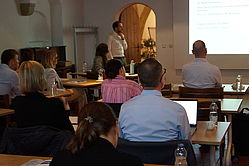 7, Sebastian Schwamberger and Tabea Bauermeister organised a conference on “Private Enforcement in the Digital Single Market” which was generously supported by the Fritz Thyssen Foundation. As a unique feature, rather than concentrating on a single legal act (such as the DMA or the DSA), the presentations addressed recurring issues in the Digital Single Market. These included the interplay b
7, Sebastian Schwamberger and Tabea Bauermeister organised a conference on “Private Enforcement in the Digital Single Market” which was generously supported by the Fritz Thyssen Foundation. As a unique feature, rather than concentrating on a single legal act (such as the DMA or the DSA), the presentations addressed recurring issues in the Digital Single Market. These included the interplay b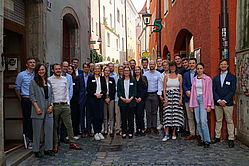 etween private and public enforcement, challenges related to quantifying damages and the burden of proof, as well as questions regarding the attribution of knowledge and fault (see program in German). The manuscripts will be published shortly in a conference volume. Many thanks to all speakers and participants!
etween private and public enforcement, challenges related to quantifying damages and the burden of proof, as well as questions regarding the attribution of knowledge and fault (see program in German). The manuscripts will be published shortly in a conference volume. Many thanks to all speakers and participants!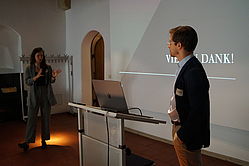
Seminar WS 24/25: "Start-ups in Commercial Law"
Can I start my own business with an idea that I originally developed for my employer? How can I protect my business concept? These and other commercial law issues gathered by a survey in the Regensburg start-up community will be dealt within the seminar offered by Tabea Bauermeister and Anna Bernzen in the upcoming winter semester. More information can be found - here
Lecture: Private Digital Law III and Oral Exam
In the summer semester of 2024, the lecture "Private Digital Law III" will be offered for the first time. It will centre around (European) platform regulations. After an introduction to the special features of the platform economy, the individual legal acts, in particular the DMA (Digital Markets Act), the DSA (Digital Services Act) and the P2B Regulation (Platform to Business), wil be examined in depth. Further information on the oral exam can be found - here
Blog post: Are competitors allowed to sue for GDPR violations?
A pharmacist is suing his competitor for an allegedly inadmissible processing of health data in online sales. But is health data even generated when ordering paracetamol or other non-prescription drugs? And even if it were, shouldn't the GDPR violation actually be claimed by the affected customers themselves? On beck-aktuell, Tabea Bauermeister discusses the Opinion of Advocate General Szpunar published on these questions in the Lindenapotheke case (C-21/23).
Lecture: Introduction to the German Civil Law at Tashkent State University of Law
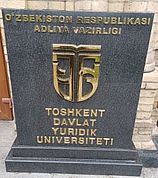 In early April, together with Prof. Dr. Anna Bernzen, Prof. Dr. Tabea Bauermeister gave an introductory lecture on civil law at the Tashkent State Universitiy of Law in Uzbekistan. For the Uzbek law students, it was a great opportunity to put their German language skills to use in a legal context, and for the lecturers it was a very enriching intercultural experience.
In early April, together with Prof. Dr. Anna Bernzen, Prof. Dr. Tabea Bauermeister gave an introductory lecture on civil law at the Tashkent State Universitiy of Law in Uzbekistan. For the Uzbek law students, it was a great opportunity to put their German language skills to use in a legal context, and for the lecturers it was a very enriching intercultural experience.
Conference: Private Enforcement in the Digital Single Market
On June 6 and 7, t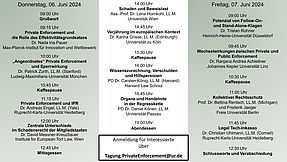 ogether with Prof. Dr. Sebastian Schwamberger, Prof. Dr. Tabea Bauermeister is organizing a conference on Private Enforcement in the Digital Single Market.
ogether with Prof. Dr. Sebastian Schwamberger, Prof. Dr. Tabea Bauermeister is organizing a conference on Private Enforcement in the Digital Single Market.
Excursion seminar to Vietnam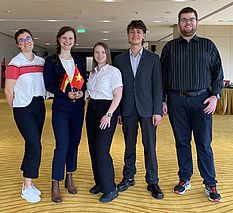
Together with students of HTW Berlin,
the University of Augsburg, the Hanoi School of Law as well as the National University of Vietnam and supervised by Tabea Bauermeister, four students of the Univerity of Regensburg participated in a seminar on "Fundamental Rights and their Impact on the Civil Law System" in Vietnam. Discussed and debated were the protection of human rights under international law and its impact on civil law. Moreover, the seminar included a moot court in which the students were able to apply their previously acquired knowledge. With regard to their flight cost, the students from Regensburg were supported by the Regensburger Universitätsstiftung.
Frankfurter Kommentar zum Kartellrecht:
Contribution on Art. 7 DMA published
With the 107th edition of the Frankfurter Kommentar zum Kartellrecht (Frankfurt Commentary on Antitrust Law), Tabea Bauermeister's contribution on Art. 7 DMA has been published. Article 7 DMA gives providers of number-independent interpersonal communication services a right to interoperability with the designated central platform services WhatsApp and Facebook Messenger. Amongst others, the contribution covers the background and genesis, the (potential) addressees, the concept and dimensions of interoperability, questions on law enforcement and related provisions.
Paper: Human rights and environmental protection through the back door?
 At the 4th German Conference for Young PIL Scholars, Tabea Bauermeister gave a presentation on the international private law dimension of the claim for damages in the proposal for a Directive on Corporate Sustainability Due Diligence. Within the compendium "Die Achtung des Fremden", the corresponding transcript has now been published.
At the 4th German Conference for Young PIL Scholars, Tabea Bauermeister gave a presentation on the international private law dimension of the claim for damages in the proposal for a Directive on Corporate Sustainability Due Diligence. Within the compendium "Die Achtung des Fremden", the corresponding transcript has now been published.
Lecture: EU Competition Law and the Digital Markets Act
On 27/02/24, as part of the Zoom conference "New Competition Law of Uzbekistan: Implications from the international scholarship" hosted by the Tashkent State University of Law, Tabea Bauermeister held a presentation on European competition law and the Digital Markets Act.
JURA: mock exam published in legal educational journal
Under the title "The Pitfalls of the Touchscreen", the legal educational journal JURA published a mock exam composed by Tabea Bauermeister on errors while concluding a contract. See JURA 2024, 297
Lecture "The change to digital products according to § 327r BGB – an infringement of the principle of pacta sunt servanda?"
 With regard to Sec. 327r of the German Civil Code, the government draft (BT-Drs. 19/27653, p. 77) states that the provision is an "exception" and that – as the contractual parties are generally bound by what they agreed upon – the provision must be interpreted in a restrictive way. But is that really true? Does Sec. 327r BGB infringe the principle of pacta sunt servanda? On Monday, February 5, 2024, as part of the Regensburger Fakultätsseminar, Tabea Bauermeister gave a presentation on these very questions.
With regard to Sec. 327r of the German Civil Code, the government draft (BT-Drs. 19/27653, p. 77) states that the provision is an "exception" and that – as the contractual parties are generally bound by what they agreed upon – the provision must be interpreted in a restrictive way. But is that really true? Does Sec. 327r BGB infringe the principle of pacta sunt servanda? On Monday, February 5, 2024, as part of the Regensburger Fakultätsseminar, Tabea Bauermeister gave a presentation on these very questions.
K&R: paper on Sec. 327p Para. 1 Sentence 2 of the German Civil Code (BGB)
In its second issue 2024, K&R published a re-print of Tabea Bauermeister's reflections on Sec. 327p (1) (2) of the German Civil Code (BGB) and the question of how the still relatively new provision relates to previous case law on digital remote access.
Presentation “European undertakings as world 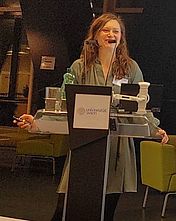 police?”
police?”
During the conference "Wirtschaft und Methode" at the University of Vienna on 30 November 2023, Tabea Bauermeister spoke about the future CSDD-Directive and its use of undertakings. In particular, she asked whether undertakings are instrumentalised in order to project European human rights standards and environmental protection provisions into non-EU countries. More about the conference: https://wpn.univie.ac.at/startseite/
Comment on the Bundeskartellamt-decision on Google data processing (05/10/2023 - B7-70/21)
In practical terms, the Bundeskartellamt-decision on Google data processing (05/10/2023 - B7-70/21) means that Alphabet must grant its users a comprehensive right of choice regarding cross-service data processing. In her comment published in WuW 12/2023, Tabea Bauermeister highlights that the comparison with previous proceedings based on Section 19 of the German Competition Act and with the Digital Markets Act is at least as interesting as these practical benefits.
Presentation “Digital remote access – re-evaluation because of new EU law?”
because of new EU law?”
During the conference "Legal Enforcement in the Digital Space" at the Johannes Kepler University Linz on 24 November 2023, Tabea Bauermeister explored the question of whether the Digital Content Directive and the Sale of Goods Directive require re-evaluating the case law on digital remote access.
![]()
![]()
Blog post about new provisions in German Competition Law
On Kluwer Competition Law Blog, Tabea Bauermeister introduces the three major novelties following the latest amendment law to the German Competition Act on 7 November 2023:
-
a new competition tool irrespective of an infringement but relying on problematic market conditions
-
national provisions accompanying the DMA (Bundeskartellamt-investigations into possible infringements of the DMA as well as provisions allowing for damage claims)
-
a presumption of infringement benefits
Lecture "On autonomous arbitrary law enforcement in a digitalized world"
As for e.g. a landlord it is quite tempting to change the door locks in the absence of the non-evicted tenant, taking law enforcement into one’s own hands is a longstanding, well-known whish. Because a digital door lock can be reprogrammed remotely and the battery of an e-car can be provided with a recharge lock, digitalization increasingly adds further opportunities. Regarding these new methods, the BGH (26/10/2022 - XII ZR 89/21) expressed skepticism. However, Section 327p para. 1 p. 2 BGB now provides for the possibility of preventing further use by the contractual partner. As part of a lecture at Bucerius Law School on 15 November, Tabea Bauermeister explored the question of whether following this new provision, as long as only digital tools are used, autonomous arbitrary law enforcement is now a feasible option.
New lecture: "Private Digital Law I" (Mon, 4-6 p.m.)
 Bauermeister will offer a new lecture on contract law and digitization (“Private Digital Law I). The lecture will both address the new legislation regarding digital products as well as current workarounds where no legislation exists. Furthermore, the important topics of “Smart Contracts” and “Fin Tech” will be covered.
Bauermeister will offer a new lecture on contract law and digitization (“Private Digital Law I). The lecture will both address the new legislation regarding digital products as well as current workarounds where no legislation exists. Furthermore, the important topics of “Smart Contracts” and “Fin Tech” will be covered.Lecture "Private Enforcement of the Digital Markets Act"
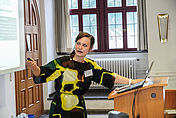 On September 30th, as part of the interdisciplinary postdoctoral conference "Competition in Digital Markets", Tabea Bauermeister gave a presentation on Private Enforcement of the Digital Markets Act at the University of Würzburg.
On September 30th, as part of the interdisciplinary postdoctoral conference "Competition in Digital Markets", Tabea Bauermeister gave a presentation on Private Enforcement of the Digital Markets Act at the University of Würzburg.
![]()
Fotos: Wolfram Merger
Further information about the conference:
the bottom of how it works.
Lecture "Rights of Nature – Nothing but Symbolism?"
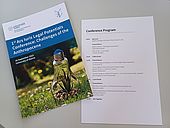
On September 26th, as part of the "1st Ars Iuris Legal Potentials Conference", Tabea Bauermeister gave a presentation on the Rights-of-Nature-movement and its potential regarding law enforcement.
![]()
On November 1st, a short version of said presentation was published on Ars Iuris Vienna – Blog: https://arsiuris.univie.ac.at/blog/detailansicht-blog/news/rights-of-nature-nothing-but-symbolism/
Lecture "Sec. 327p Para. 1 Sentence 2 of the German Civil Code – Moderate Development or System Disruption?"
At the 24th DSRI Herbstakademie, on September 14th,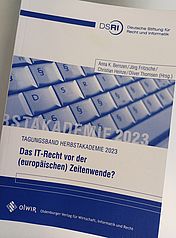 Tabea Bauermeister delivered a presentation on the significance of Sec. 327p Para. 1 Sentence 2 of the German Civil Code (BGB) for digital remote access. The corresponding paper was published in Bernzen/Fritzsche/Heinze/Thomsen, Das IT-Recht vor der (europäischen) Zeitenwende, 2023, 757-772.
Tabea Bauermeister delivered a presentation on the significance of Sec. 327p Para. 1 Sentence 2 of the German Civil Code (BGB) for digital remote access. The corresponding paper was published in Bernzen/Fritzsche/Heinze/Thomsen, Das IT-Recht vor der (europäischen) Zeitenwende, 2023, 757-772.
Further information about the conference: https://dsri.de/herbstakademie/


